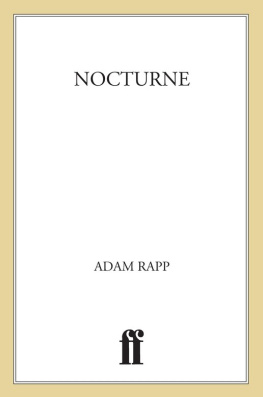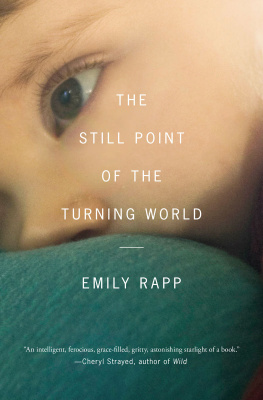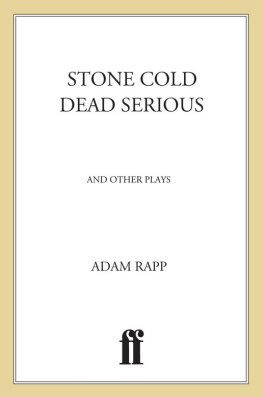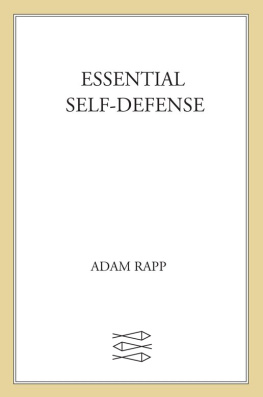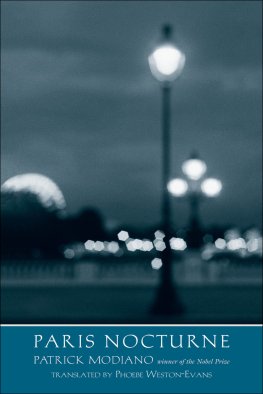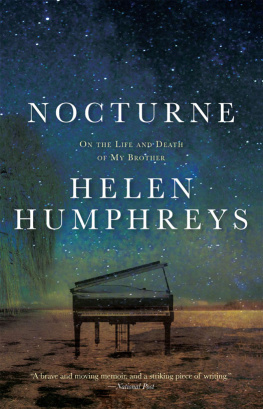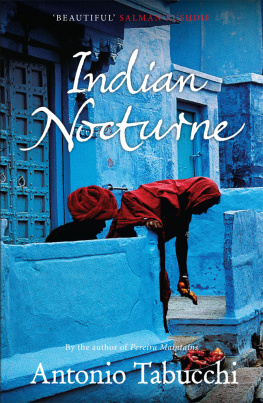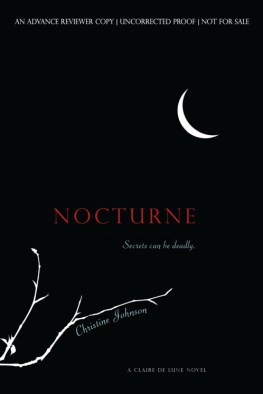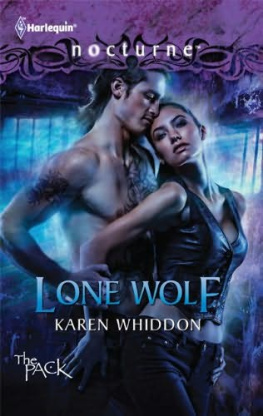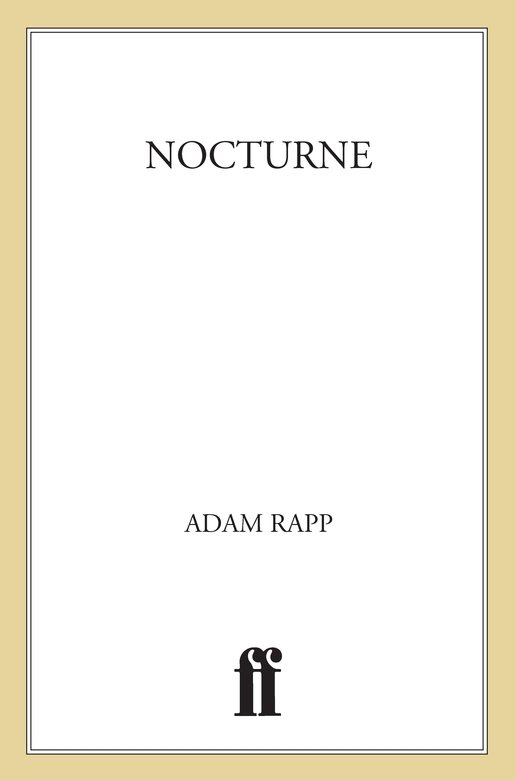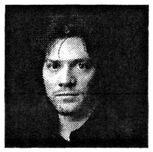The author would like to thank Brad Rouse, Carl Mulert, Marsha Norman, Dallas Roberts, Marcus Stern, Elizabeth Reaser, Walt Niedner, and especially Bob Brustein.
Adam Rapp has been the recipient of the 1997 Herbert & Patricia Brodkin Scholarship; a fellowship to the Camargo Foundation in Cassis, France; two Lincoln Center LeComte du Nouy Awards; the 1999 Princess Grace Award for Playwriting; the 2000 Roger L. Stevens Award from the Kennedy Center Fund for New American Plays; a 2000 Suite Residency with Mabou Mines; and the 2001 Helen Merrill Award for Emerging Playwrights. His plays have been produced at Victory Gardens in Chicago, The 24th Street Theatre in Los Angeles, The Juilliard School, The American Repertory Theatre in Cambridge, Massachusetts, Berkeley Repertory, New York Theatre Workshop, and the Bush Theatre in London. A graduate of Clarke College in Dubuque, Iowa, he also completed the Lila Acheson Wallace Playwriting Fellowship at Juillard.
Nocturne was awarded Bostons Elliot Norton Award for Best New Script as well as Best New Play by the Independent Reviewers of New England. It was chosen as one of the ten Best Plays of 20002001 (the annual Chronicle of U.S. theater).
Rapp is also the author of the novels Missing the Piano, The Buffalo Tree , and The Copper Elephant . He lives in New York City.
My father died that night.
When Jerry arrived the following morning with his hospice supplies, he cleaned the room and called in the death and packed up my fathers few possessions. When he woke me, I was asleep on the floor next to the La-Z-Boy, my fathers hand still grasped in mine.
Jerry said that my father was day-to-day and that they were surprised he had made it through the fall. He said it was good that I had come. That it probably helped my father let go.
There was a small memorial service in a grotto behind a chapel that I had never seen before. My mother was not in attendance. I didnt recognize anyone and I doubt that anyone recognized me. It snowed and it was cold and veryfew spoke on his behalf, but those who did said he was a fine man who did great things for the school district and the children at Monge Junior High School.
He chose to be cremated, and his ashes were stuffed into a small pinewood box that some anonymous school district colleague signed for at the funeral home.
Jerry was kind enough to offer me a ride to the train station, but although I told him I was grateful, I had to refuse. I walked to Union Station in the snow, caught the Metraliner north to Chicago and the overnight Amtrak east to Grand Central Station wearing the same clothes I had departed in.
My father left me four thousand dollars and the Steinway. For thirty-five dollars a month I keep the Steinway in storage back in Joliet. Perhaps someday I will play it again. Perhaps Ill sell it.
The other day I called the redheaded girl with the gray-green eyes. We are going to meet again sometime very soon. She told me she missed me. I told her I had so much to tell her.
Even the greatest sleeping sea can be awakened by the tide.
Grief does not expire like a candle or the beacon on a lighthouse. It simply changes temperature. It becomes a kind of personal weather system. Snow settles in the liver. The bowels grow thick with humidity. Ice congeals in the stomach. Frost spiderwebs in the lungs. The heart fills with warm rain that turns to mist and evaporates through a colder artery.
Sometimes when I cant sleep Ill walk up the east side of First Avenue. A cabby naps in the back seat of his doubleparked taxi. A Ukrainian woman cleans a fish at the counter of her darkened diner. A Dominican man sitting in the entrance to the butchers stares out at nothing in particular, his eyes black as burnt stones.
I am continually amazed by the 5 a.m. silence that is possible in New York. The streetlights infinitesimally swaying as though bored. That flattened hour when, in some barren, half-dreamed lot, even the cars seem to be sleeping.
I cross to the west side of First Avenue at Twenty-third Street. A fellow insomniac is reading a paperback in thewindow of an all-night diner. This is where I turn around and walk home on the opposite side of the street; past the Italian bakery and the hospital with its silent, sliding doors, and the Korean deli at Thirteenth Street where a small Mexican boy cuts flowers and sprays down the sidewalk.
I reach St. Marks Place and cross back to the east side of First Avenue. With a kind of recovered peace I climb the four flights of stairs and return to my apartment with the bathtub in the kitchen.
My sister.
My father.
My mother sleepwalking in a cotton hospital dress.
(The distant sound of Griegs Nocturne can be heard.)
Stars.
Moonlight.
A black field full of snow
How many breaths do you take in a night?
The Underwood still calls to me.
Still calls to me through the rich, oblivious darkness.
Fifteen years ago I killed my sister.
There.
I said it.
I can change the order of the words. My sister I killed fifteen years ago. I, fifteen years ago, killed my sister. Sister my killed I years ago fifteen.
I can cite various definitions. To deprive of life: The farmer killed the rabid dog. To put an end to: The umpire killed the tennis match. To mark for omission: He killed the paragraph. To destroy the vital essential quality of: The dentist killed the nerve with Novocain. To cause to stop: The bus driver killed the engine. To cause extreme pain to: His monologue killed the audience.
To slay. To murder. To assassinate. To dispatch. To execute.
You can play with tenses. Will kill. Did kill. Have killed. Will have killed. Would like to have killed.
You can turn it into a gerund. Killing.
Theres a kind of progress with a gerund.
If you conjugate in the past tense, its all the same. I killed. You killed. He, she, it killed. They killed. You all killed. We killed. Theres no way around it.
Fifteen years ago I killed my sister.
Its dumb-sounding, the way most facts are. Like a former President or the names of bones.
Grover Cleveland.
Fibula. Tibia. Femur.
Theres a finality in a fact. Something medical almost. A fact is crafted. Vaguely industrial. It has permanence. Its a stain or a smudge. A botch or a spot or a blemish. A fact is a flaw Its made of wood and left to fossilize; to gatherminerals and geologically imprint itself on the side of a mountain.
You can look at the back of your hand and know exactly how the bones move.
(The sound of a distant piano.)

